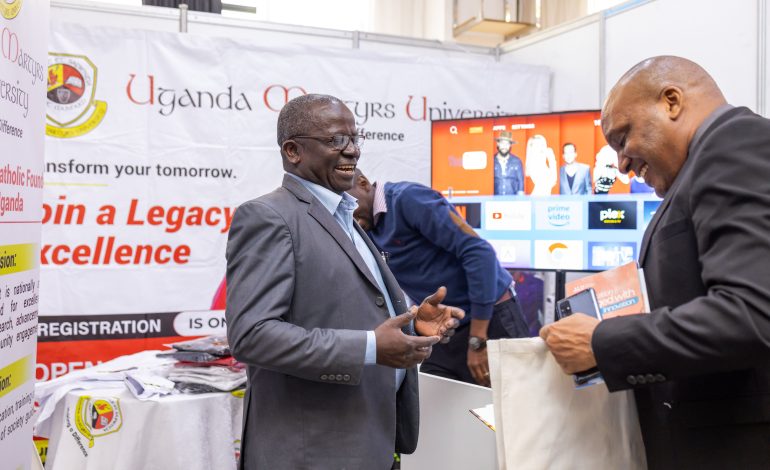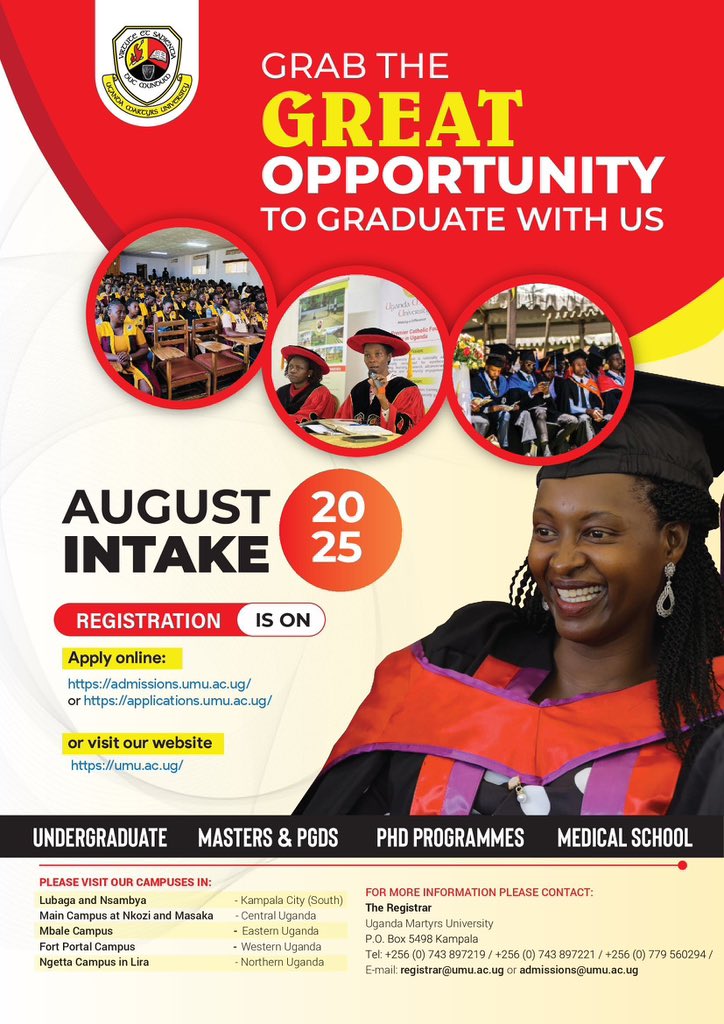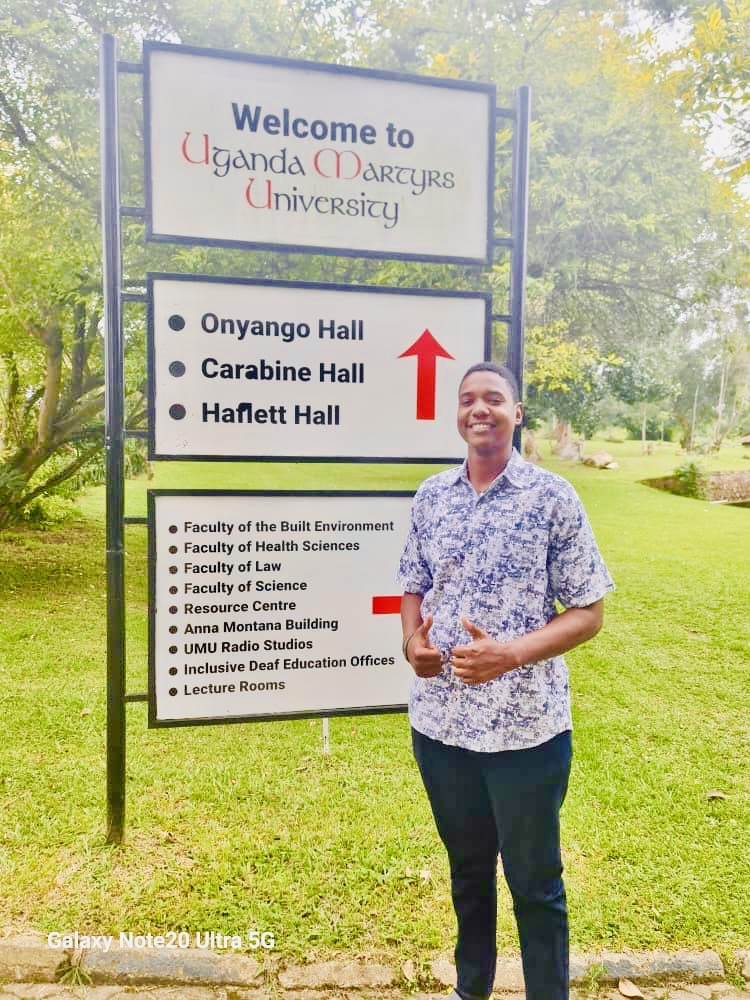
Uganda Martyrs University Hosts Environment and Conservation Conference 2025
Mar 19, 2025
Uganda Martyrs University (UMU) successfully hosted the Environment and Conservation Conference 2025, an annual event aimed at addressing critical environmental issues and promoting sustainable conservation efforts. The conference, held as a post-event to commemorate United Nations World Wildlife Day, brought together experts, policymakers, conservationists, and stakeholders to discuss solutions to pressing environmental challenges.
This year’s conference was centered on the theme “People and Planet; Environment and Conservation,” emphasizing the delicate balance between human development and nature preservation. It highlighted the increasing threats to biodiversity and natural ecosystems due to rapid industrialization, deforestation, climate change, and unsustainable human activities. The discussion underscored the need for strategic investment in conservation efforts to ensure the planet remains habitable for future generations.
 One of the key points raised during the conference was the economic value of nature and its services. It was revealed that approximately $44 trillion of global GDP depends on nature-based services such as pollination, carbon sequestration, water purification, and pharmaceuticals. Despite this, conservation efforts remain significantly underfunded. Estimates indicate that between $124 billion to $143 billion is currently being invested in conservation efforts annually, while the required funding ranges between $722 billion to $967 billion, creating a worrying financial deficit of $598 billion to $824 billion per year. The conference addressed the financial gaps in conservation and the over-reliance on donor funding, which is becoming increasingly unpredictable. The need for strategic partnerships between governments, industries, and conservation organizations was emphasized as a critical step toward achieving long-term environmental sustainability.
One of the key points raised during the conference was the economic value of nature and its services. It was revealed that approximately $44 trillion of global GDP depends on nature-based services such as pollination, carbon sequestration, water purification, and pharmaceuticals. Despite this, conservation efforts remain significantly underfunded. Estimates indicate that between $124 billion to $143 billion is currently being invested in conservation efforts annually, while the required funding ranges between $722 billion to $967 billion, creating a worrying financial deficit of $598 billion to $824 billion per year. The conference addressed the financial gaps in conservation and the over-reliance on donor funding, which is becoming increasingly unpredictable. The need for strategic partnerships between governments, industries, and conservation organizations was emphasized as a critical step toward achieving long-term environmental sustainability.
 The Vice Chancellor, Prof. Patrick Kyamanywa opened the conference with an inspiring welcome, aligning the theme “People and Planet: Environment and Conservation” with a broad spectrum of SDGs—specifically Goals 6 (Clean Water and Sanitation), 11 (Sustainable Cities and Communities), and 14 (Life Below Water). “Our mission transcends wildlife—it’s about building resilient communities and ecosystems,” the VC declared. Highlighting SDG 11, the VC emphasized sustainable urbanization as critical to reducing habitat encroachment, while SDG 14 underscored the need to protect aquatic ecosystems like Lake Victoria, vital to biodiversity and livelihoods. Conservation is a cornerstone of human development and hence urging attendees to forge solutions that integrate these goals for a holistic approach to people and planet.
The Vice Chancellor, Prof. Patrick Kyamanywa opened the conference with an inspiring welcome, aligning the theme “People and Planet: Environment and Conservation” with a broad spectrum of SDGs—specifically Goals 6 (Clean Water and Sanitation), 11 (Sustainable Cities and Communities), and 14 (Life Below Water). “Our mission transcends wildlife—it’s about building resilient communities and ecosystems,” the VC declared. Highlighting SDG 11, the VC emphasized sustainable urbanization as critical to reducing habitat encroachment, while SDG 14 underscored the need to protect aquatic ecosystems like Lake Victoria, vital to biodiversity and livelihoods. Conservation is a cornerstone of human development and hence urging attendees to forge solutions that integrate these goals for a holistic approach to people and planet.
 Musambwa Islands—Where Snakes and Birds Live with Humans: Lessons for Sustainable Wildlife Management and Tourism– Assoc. Prof. Jimmy Spire presented a fascinating case study of the Musambwa Islands in Lake Victoria, where humans, snakes, and birds coexist harmoniously. He illustrated the theme’s essence: “On Musambwa islands, people and planet are one—wildlife sustains both ecology and economy.” He credited cultural reverence for preserving biodiversity, offering a model of coexistence.
A key highlight of the conference was the signing of a Memorandum of Understanding (MoU) between Uganda Martyrs University and the National Environment Management Authority (NEMA). This agreement, known as the Raptors MOU, is aimed at enhancing efforts in the conservation of migratory birds. The MoU signing, which took place alongside the Prey in Africa event at Sheraton Hotel, Kampala, underscored the importance of collaboration in implementing effective conservation strategies.
Musambwa Islands—Where Snakes and Birds Live with Humans: Lessons for Sustainable Wildlife Management and Tourism– Assoc. Prof. Jimmy Spire presented a fascinating case study of the Musambwa Islands in Lake Victoria, where humans, snakes, and birds coexist harmoniously. He illustrated the theme’s essence: “On Musambwa islands, people and planet are one—wildlife sustains both ecology and economy.” He credited cultural reverence for preserving biodiversity, offering a model of coexistence.
A key highlight of the conference was the signing of a Memorandum of Understanding (MoU) between Uganda Martyrs University and the National Environment Management Authority (NEMA). This agreement, known as the Raptors MOU, is aimed at enhancing efforts in the conservation of migratory birds. The MoU signing, which took place alongside the Prey in Africa event at Sheraton Hotel, Kampala, underscored the importance of collaboration in implementing effective conservation strategies.
 In his closing remarks, the Guest of honor Mrs Doreen S. Katusiime, Permanent Secretary Ministry Of Tourism, Wildlife and Antiquities, expressed gratitude to all panelists, participants, and partners who contributed to the success of the conference. He encouraged continued engagement in conservation efforts, stressing the importance of harmonizing economic progress with environmental preservation.
In his closing remarks, the Guest of honor Mrs Doreen S. Katusiime, Permanent Secretary Ministry Of Tourism, Wildlife and Antiquities, expressed gratitude to all panelists, participants, and partners who contributed to the success of the conference. He encouraged continued engagement in conservation efforts, stressing the importance of harmonizing economic progress with environmental preservation.
 One of the key points raised during the conference was the economic value of nature and its services. It was revealed that approximately $44 trillion of global GDP depends on nature-based services such as pollination, carbon sequestration, water purification, and pharmaceuticals. Despite this, conservation efforts remain significantly underfunded. Estimates indicate that between $124 billion to $143 billion is currently being invested in conservation efforts annually, while the required funding ranges between $722 billion to $967 billion, creating a worrying financial deficit of $598 billion to $824 billion per year. The conference addressed the financial gaps in conservation and the over-reliance on donor funding, which is becoming increasingly unpredictable. The need for strategic partnerships between governments, industries, and conservation organizations was emphasized as a critical step toward achieving long-term environmental sustainability.
One of the key points raised during the conference was the economic value of nature and its services. It was revealed that approximately $44 trillion of global GDP depends on nature-based services such as pollination, carbon sequestration, water purification, and pharmaceuticals. Despite this, conservation efforts remain significantly underfunded. Estimates indicate that between $124 billion to $143 billion is currently being invested in conservation efforts annually, while the required funding ranges between $722 billion to $967 billion, creating a worrying financial deficit of $598 billion to $824 billion per year. The conference addressed the financial gaps in conservation and the over-reliance on donor funding, which is becoming increasingly unpredictable. The need for strategic partnerships between governments, industries, and conservation organizations was emphasized as a critical step toward achieving long-term environmental sustainability.
 The Vice Chancellor, Prof. Patrick Kyamanywa opened the conference with an inspiring welcome, aligning the theme “People and Planet: Environment and Conservation” with a broad spectrum of SDGs—specifically Goals 6 (Clean Water and Sanitation), 11 (Sustainable Cities and Communities), and 14 (Life Below Water). “Our mission transcends wildlife—it’s about building resilient communities and ecosystems,” the VC declared. Highlighting SDG 11, the VC emphasized sustainable urbanization as critical to reducing habitat encroachment, while SDG 14 underscored the need to protect aquatic ecosystems like Lake Victoria, vital to biodiversity and livelihoods. Conservation is a cornerstone of human development and hence urging attendees to forge solutions that integrate these goals for a holistic approach to people and planet.
The Vice Chancellor, Prof. Patrick Kyamanywa opened the conference with an inspiring welcome, aligning the theme “People and Planet: Environment and Conservation” with a broad spectrum of SDGs—specifically Goals 6 (Clean Water and Sanitation), 11 (Sustainable Cities and Communities), and 14 (Life Below Water). “Our mission transcends wildlife—it’s about building resilient communities and ecosystems,” the VC declared. Highlighting SDG 11, the VC emphasized sustainable urbanization as critical to reducing habitat encroachment, while SDG 14 underscored the need to protect aquatic ecosystems like Lake Victoria, vital to biodiversity and livelihoods. Conservation is a cornerstone of human development and hence urging attendees to forge solutions that integrate these goals for a holistic approach to people and planet.
 Musambwa Islands—Where Snakes and Birds Live with Humans: Lessons for Sustainable Wildlife Management and Tourism– Assoc. Prof. Jimmy Spire presented a fascinating case study of the Musambwa Islands in Lake Victoria, where humans, snakes, and birds coexist harmoniously. He illustrated the theme’s essence: “On Musambwa islands, people and planet are one—wildlife sustains both ecology and economy.” He credited cultural reverence for preserving biodiversity, offering a model of coexistence.
A key highlight of the conference was the signing of a Memorandum of Understanding (MoU) between Uganda Martyrs University and the National Environment Management Authority (NEMA). This agreement, known as the Raptors MOU, is aimed at enhancing efforts in the conservation of migratory birds. The MoU signing, which took place alongside the Prey in Africa event at Sheraton Hotel, Kampala, underscored the importance of collaboration in implementing effective conservation strategies.
Musambwa Islands—Where Snakes and Birds Live with Humans: Lessons for Sustainable Wildlife Management and Tourism– Assoc. Prof. Jimmy Spire presented a fascinating case study of the Musambwa Islands in Lake Victoria, where humans, snakes, and birds coexist harmoniously. He illustrated the theme’s essence: “On Musambwa islands, people and planet are one—wildlife sustains both ecology and economy.” He credited cultural reverence for preserving biodiversity, offering a model of coexistence.
A key highlight of the conference was the signing of a Memorandum of Understanding (MoU) between Uganda Martyrs University and the National Environment Management Authority (NEMA). This agreement, known as the Raptors MOU, is aimed at enhancing efforts in the conservation of migratory birds. The MoU signing, which took place alongside the Prey in Africa event at Sheraton Hotel, Kampala, underscored the importance of collaboration in implementing effective conservation strategies.
 In his closing remarks, the Guest of honor Mrs Doreen S. Katusiime, Permanent Secretary Ministry Of Tourism, Wildlife and Antiquities, expressed gratitude to all panelists, participants, and partners who contributed to the success of the conference. He encouraged continued engagement in conservation efforts, stressing the importance of harmonizing economic progress with environmental preservation.
In his closing remarks, the Guest of honor Mrs Doreen S. Katusiime, Permanent Secretary Ministry Of Tourism, Wildlife and Antiquities, expressed gratitude to all panelists, participants, and partners who contributed to the success of the conference. He encouraged continued engagement in conservation efforts, stressing the importance of harmonizing economic progress with environmental preservation.







